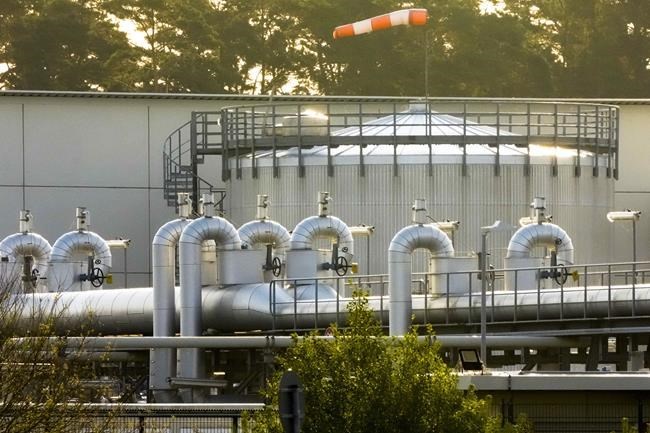OTTAWA — The Ukrainian Canadian Congress is urging the Canadian government to revoke a permit that allowed the export of a turbine repaired in Montreal to a Russian energy giant.
The permit granted Siemens Canada an exemption to sanctions against Russia for two years starting in early July and would allow the company to import and repair up to five more turbines as per their maintenance schedule.
The parts would be sent back to Germany for use in Gazprom's Nord Stream 1 pipeline. The pipeline ordinarily supplies natural gas to Germany and other European countries but is currently shut down, with the Russian state-controlled company blaming problems on a gas leak.
Ukrainian Canadian Congress CEO Ihor Michalchyshyn told the House of Commons Foreign Affairs Committee Wednesday that it's time for Canada to "show strength" and stand up to Russia during its ongoing assault on Ukraine by upholding its sanctions regime.
He said Canada's decision is playing into Russia's strategy to make the West look incoherent.
"The more that they can poke holes in the sanctions regimes, find differences between jurisdictions and build inconsistencies between our governments that are largely on the same page on this issue, we believe that is their overall goal," he said.
"This has become a major international matter. It is part of the Russian disinformation flow, as has been said. And they continue to find an oil leak a week, basically, to find reasons why they're not going to provide more energy to Europe."
The Canadian government has defended its decision to allow the exports, saying the move is intended to support Europe during the energy crisis created by the war.
The committee, which initiated a study of the turbines issue in July, heard from Foreign Affairs Minister Mélanie Joly last month. She said Canada's sanctions exemption was a way to call Russia's bluff because it would deny President Vladimir Putin a pretext for reducing the flow of natural gas through the pipeline.
That was one of the concerns cited in a "memorandum for action" prepared for Global Affairs Canada recommending the exemption, which was filed in Federal Court in response to a legal challenge of the decision by the Ukrainian World Congress.
"Russia appears to be leveraging this situation to blame western sanctions for energy insecurity even though it maintains the ability to supply Europe with the natural gas that it requires," the document said. "Allowing Russia to maintain this narrative risks broader implications for support for Ukraine."
But witnesses who appeared at the committee Wednesday said that the strategy hasn't worked, as Russia continues to "weaponize energy," as multiple witnesses and MPs put it, and blame sanctions for the slowdowns in gas delivery.
"The Kremlin has now explicitly stated that gas will only start flowing through Nord Stream 1 once Canadian and western sanctions have been lifted. This is blackmail," said Marcus Kolga, a senior fellow at the Macdonald-Laurier Institute.
Benjamin Schmitt, a research associate at Harvard University, said a sanctions exemption would only have been justifiable "in a world where Russia hasn't been weaponizing energy for years."
But it has, he said. And Germany's own technical assessments have stated that Russia's explanations for reductions in gas flow "were nothing more than pretext for another political energy cut," said Schmitt. He argued it is baffling that, despite knowing this, Berlin continued to pressure Ottawa to return the repaired turbines.
Germany and the United States have stood behind Canada's decision as Western nations grapple with how to balance support for Ukraine with Europe's energy needs ahead of winter.
At an annual economic forum in Vladivostok, Russia, on Wednesday, Putin dismissed the argument that Russia was using energy as a weapon by suspending Nord Stream 1 and said sanctions had made the pipeline turbine unsafe to operate.
Putin threatened to cut off energy supplies completely if the West tries to put a price cap on Russian exports, a move the European Union has signalled it is working toward. He said, "we will just halt supplies if it contradicts our economic interests. We won't supply any gas, oil, diesel oil or coal.”
The Ukrainian Canadian Congress told the House committee Wednesday that it wants Canada to take stronger measures in response to the war that began with Russia's invasion of Ukraine in February.
It is asking for Canada to designate the Russian Federation as a state sponsor of terrorism, expel the Russian ambassador from Canada and suspend travel permits for Russians wishing to travel here.
Most countries in Europe have expelled Russian diplomats since the conflict began, and the European Union recently moved to make it more difficult for Russian citizens to enter.
Prime Minister Justin Trudeau has previously justified the presence of Russian diplomats in Canada by saying that he wants to avoid a tit-for-tat response that could hinder the work conducted by Canadians assigned to Moscow.
U.S. President Joe Biden said "no" Tuesday, when asked whether Russia should be designated as a state sponsor of terrorism, despite bipartisan support for such a move in the U.S. Senate.
This report by The Canadian Press was first published Sept. 7, 2022.
— With files from The Associated Press.
Marie-Danielle Smith, The Canadian Press



